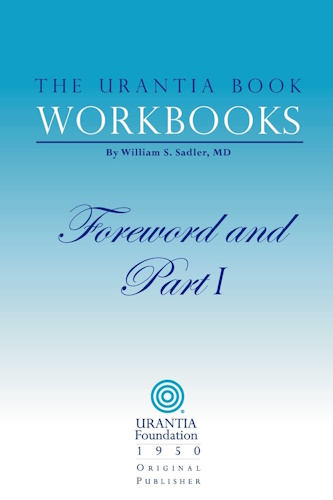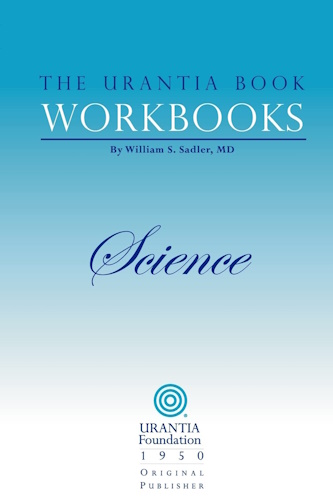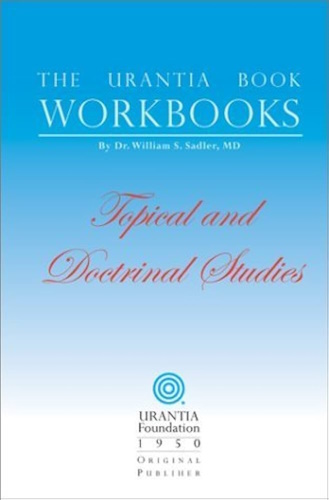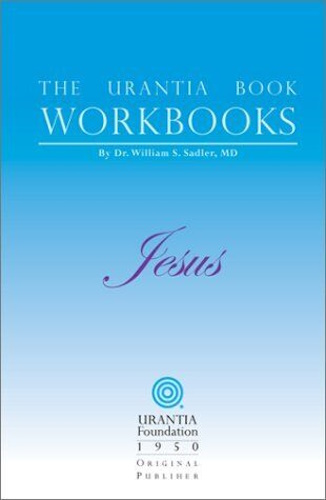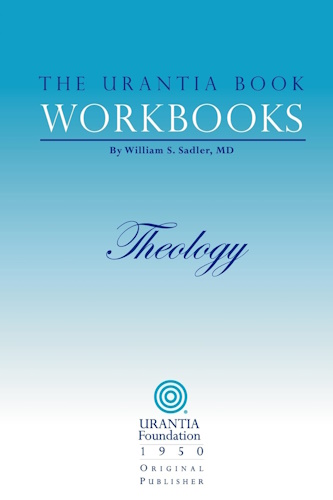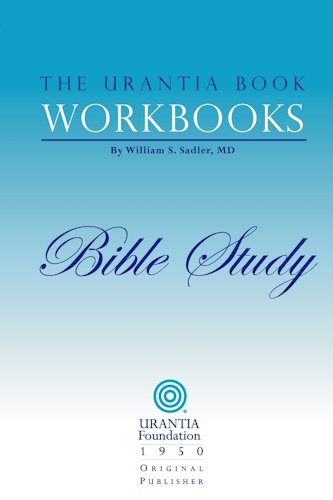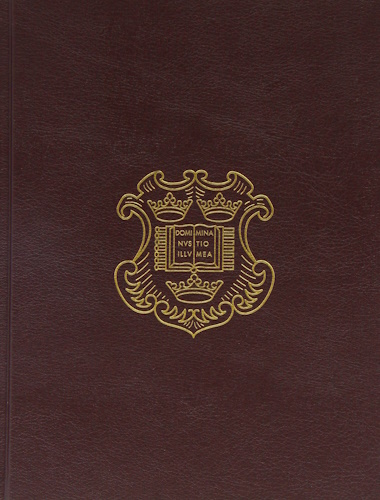![]()
Urantia Namesake
by Troy R. Bishop
![]()
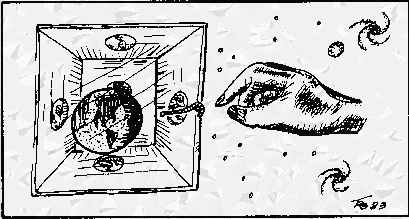
![]()
Most persons who read The URANTIA Book have probably wondered at some time or other about the meaning of the word URANTIA. The question of the meaning of Urantia can be addressed in terms of Earth languages, which came after it, or the celestial language of which it is a part. The latter, if feasible, seems the most meaningful approach. One starting point in this direction is to look for patterns in celestial place-naming conventions in The URANTIA Book. At various universe levels, it is generally--but perhaps not always--the lower that names the higher; the higher does not generally reveal itself by name to the lower. This pattern begins with Paradise Deity, the First Source and Center (22:4). The lower often derive their dwelling-place name from the name of the assistant ruler at some level above them. There may be many reasons for this; for example, it is the assistant, not the superior, who deals with the level below.
Such a convention could explain the name of our system, Satania (182:5-6). Previous to the rebellion, Lucifer ruled as the system sovereign (601:3-5), assisted by his lieutenant, Satan (602:4). Satan was the individual actually to contact with the individual worlds of the system (602:1; 604:3; 609:6; 611:3). To the system worlds, Satan was the immediate representative of system administration, until he and Lucifer were dethroned.
Place-naming for the second in command was also observed when the Planetary Prince, Caligastia, named the planetary headquarters city Dalamatia, in honor of his lieutenant, Daligastia (743:4). In a less pronounced but very important example, the sphere of the order of Melchizedeks is named Melchizedek, which is the name of the person who is a co-source of the order and, under Gabriel, Michael, and the Mother Spirit, their leader.
In an exciting and spectacular example of the celestial convention of place-naming for the second in command, our entire superuniverse, Orvonton, comprising one-seventh of the organized and inhabited creation of space and time, is named after the Infinite Spirit's seventh Paradise satellite (198:5), headquarters of Supreme Executive Number Seven--the assistant through whom Master Spirit Number Seven, ruler of Orvonton, administers his domain. As the sphere Melchizedek is named after the high being Melchizedek, the seventh executive world of the Infinite Spirit might be named after the high executive who administers the superuniverse from it. His name thus might be Orvonton; or it might be Orvon, the ton suffix constituting a place designation, as in Washington or Salvington. (Though these English suffixes might not be part of the higher languages of creation, they are used in the rendering of many higher words presented in The URANTIA Book.) One might tend to discount the terminal ton as just such a suffix, but such an ending appears in the name of at least one being at the Paradise level: Majeston, where it seems that the terminal syllable is actually part of the root name. It is true in this case, however, that the t in the ending is a part of the stem--not a suffix. In the case of the sphere Melchizedek, there is no suffix added to the name of the individual for whom the sphere is named. Being free to choose either Orvon or Orvonton as the name for the Seventh Supreme Executive, this discussion will choose Orvon, though the other choice would not change the essence of what follows.
Urantia and its historical derivatives are ancient and also ultimately foreign. In ancient Ur words--for example, Urartu and Urmia--Ur is pronounced oor. Similarly, the initial--and perhaps the terminal--a in Urantia would be pronounced with an ah sound, as in the final a in garage. Thus, before modernization and anglicanization--or rather Americanization, Urantia might properly be pronounced oor - ahn - tee - ah. If the initial o in Orvonton is pronounced with the same ancient and pre-English sound of oo, the comparative pronunciation of the two words is:
Oor - ahn - tia --- Urantia
Oor - vahn - ton --- Orvonton
One might suspect that the v in Orvonton has become silent over time to produce Urantia; but both Orvonton and Urantia are revealed celestial words, probably not subject--or as subject--in their celestial habitat to such evolution. The dropping of the v from Orvonton to Urantia might indicate a subtle difference in meaning: for example, a diminutive form. The suffixes in the two names can be considered to be equivalent, since they are place suffixes.
Oron as a celestially derived variant of Orvon is suggested in an intriguing and potentially spectacular example. On the eastern edge of the Mediterranean Sea, where the sunken Hecataeus Ridge, suspected as being the Edenic Peninsula, joins the coast, a river flows inland in a direct line that would include the ridge, were it not abruptly detoured by a sudden upthrust of mountains parallel to the coast line. (Upthrust in connection with the sinking of Eden? See 826:6) This river, flowing where the great river of Eden might have flowed, is called the Orontes. Pronouncing the word aloud reveals its kinship to Urantia.
The possible metamorphosis of Oor - vahn to Oor - ahn can reveal great meaning in the name Urantia and in time-honored derivatives of Ur or Oor, as in Urartu, the civilization arising at Lake Van after the arrival there of the loyal staff of the rebellious Planetary Prince. This possiblilty of Urantia--least of Satania--as a namesake of the administrator of the entire superuniverse of Orvonton may be a linguistic instance, in a celestial setting, of the least truly being greatest.
© 1983 Troy R. Bishop. "Urantia Namesake" may be freely duplicated electronically and transmitted across networks and the Internet if the copyright notice and this permission notice appear on all copies.
![]()
![]()
Disclaimer:
Some material presented will contain links, quotes, ideologies, etc., the contents of which should be understood to first, in their whole, reflect the views or opinions of their editors, and second, are used in my personal research as "fair use" sources only, and not espousement one way or the other. Researching for 'truth' leads one all over the place...a piece here, a piece there. As a researcher, I hunt, gather and disassemble resources, trying to put all the pieces into a coherent and logical whole. I encourage you to do the same. And please remember, these pages are only my effort to collect all the pieces I can find and see if they properly fit into the 'reality aggregate'.
Personal Position:
I've come to realize that 'truth' boils down to what we 'believe' the facts we've gathered point to. We only 'know' what we've 'experienced' firsthand. Everything else - what we read, what we watch, what we hear - is what someone else's gathered facts point to and 'they' 'believe' is 'truth', so that 'truth' seems to change in direct proportion to newly gathered facts divided by applied plausibility. Though I believe there is 'truth', until someone representing the celestial realm visibly appears and presents the heavenly records of Facts And Lies In The Order They Happened, I can't know for sure exactly what "the whole truth' on any given subject is, and what applies to me applies to everyone. Until then I'll continue to ask, "what does The Urantia Book say on the subject?"
~Gail Bird Allen
![]()
![]()

